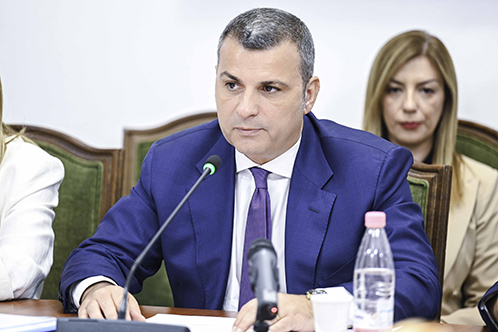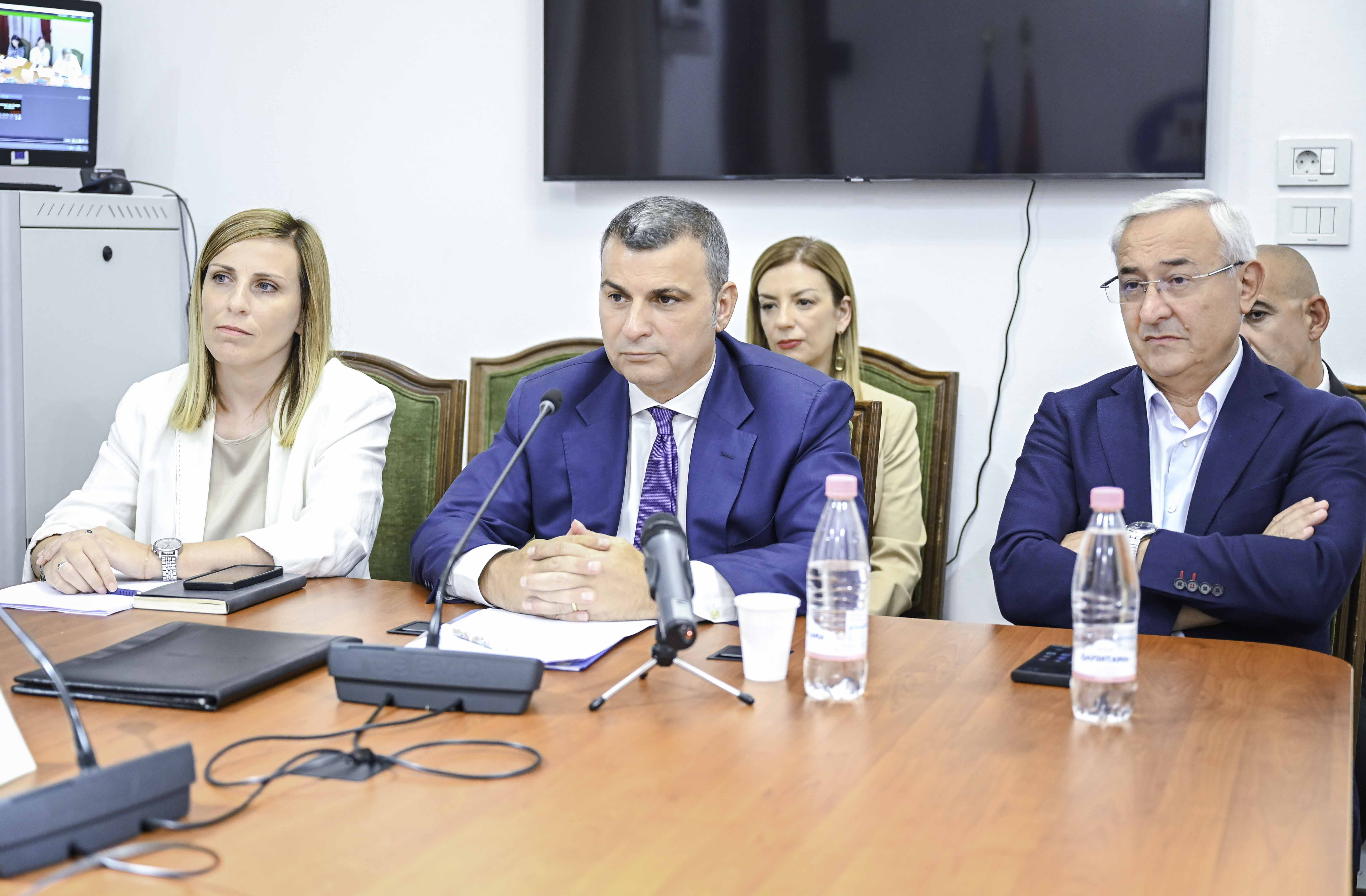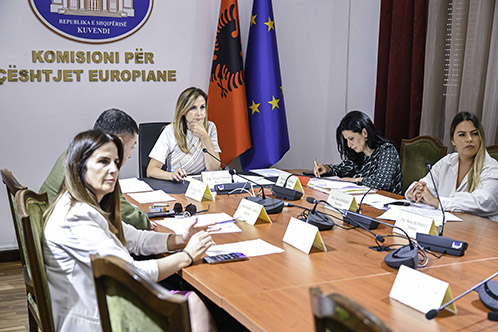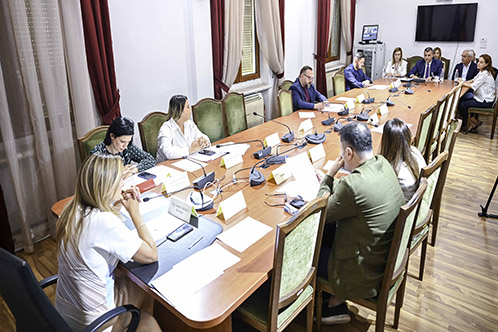BANK OF ALBANIA
PRESS RELEASE
Governor Sejko: Address at the Hearing of the European Affairs Committee of the Albanian Parliament on the preparation of Albanian institutions regarding Albania’s participation process in the Single Euro Payments Area (SEPA)
Publication date: 17.07.2024
Honourable Chair,
Honourable members of the Committee,
First of all, thank you for the invitation and the opportunity to share with you the work we have dedicated to the first step towards the economic integration in the European Union. This step regards to the official submission of Albania’s application to the European Payments Council, for participating in the Single Euro Payments Area, also known as SEPA. The application was sent in June, as scheduled in the action plan. Given the multi-dimensional importance of SEPA, I extend my gratitude for the attention expressed by this Committee in the process of Albania’s membership into SEPA. Its successful finalisation will benefit from the support of all the public institutions involved in the integration processes.

Before delving into more details regarding the application process, allow me to briefly summarise its history and context. The work for Albania’s participation in SEPA has started in 2021, when the Bank of Albania became part of the regional project “Payments modernization in the Western Balkans”. This project originates from the agreements achieved under Berlin Process and aims at developing financial and economic relationships among Western Balkan countries, while simultaneously integrating the region into the European Union. In November 2023, the European Commission, to encouraging the efforts made by the countries to expand their economic integration with the European market, included the accelerated participation in SEPA in their priority agenda of regional enlargement. Previous assessments of the World Bank experts showed that Albania was noticeably prepared to start the application, since it fulfilled almost all the criteria. In particular, it was assessed that Albania had made a significant progress regarding the alignment of its payment legislation with that of the European Union. The commitment to start the application for membership in SEPA was re-highlighted in the Ministerial as well: “The Western Balkans toward the Single Euro Payments Area (SEPA)”, which was held on 28 February of current year, where Albania expressed its dedication to submit the application by June.

The Bank of Albania has led and coordinated the work for submitting the application. However, to accomplish this task, the contribution and cooperation of other public institutions, as per the requirements of the application, was necessary. I would like to take a moment to thank all the institutions involved in the process for their utmost engagement dedicated to this work, particularly the Ministry of Finances. The Bank of Albania compiled an action plan, coordinated and cooperated with all the national institutions involved in the process, while established bridges of communication with the European Payments Council and the European Commission, in order to address every arising during the process. The entire application process was conducted through the valuable assistance of the World Bank.
Allow me to stress out that within less than 5 months, a voluminous and detailed material was compiled, and all the stages of preliminary consultations with the European Payments Council and the European Commission were successfully completed thanks to this coordination and cooperation.

The criteria set forth by the European Payments Council for countries that apply to participate in SEPA are concentrated in two aspects. First, the applicant should demonstrate strong economic links with the European Union, and second, it should demonstrate the alignment of its legislation with that of the European Unions in the area of payments, but not exclusively. The latter has the largest volume in the application.
In the area of payments, Albania demonstrates a high legal compliance with the Acquis and the regulatory framework of SEPA. Since 2018, Albania has accelerated its efforts in this regard, through the drafting by the Bank of Albania and the approval of the Law “On Payment Services” and the regulatory framework for the implementation thereof. This law transposes the EU Directive on Payment Services, known as PSD2. The approval of this law ensures that competition, transparency and consumer protection are maintained during the provision of payment services, following the standards of the European Union. In order to fully align the regulatory framework of payments with the SEPA criteria, in March and April, the Bank of Albania prepared and approved a new regulation, which transposes the SEPA regulation. Alongside laying down certain harmonised standards, this regulation gives the banking system the necessary time to prepare its infrastructure to adapt to the SEPA schemes. Another aspect of legal compliance is related to the supervisory practices of the banking system and the regulatory requirements on capital, which were for the most part congruent to the EU legislation on the context of SEPA.

A delicate point in the application is the legal compliance as regards the measures adopted for preventing money laundering and countering of terrorist financing. The delisting of Albania from the “grey” list last year, removed a barrier that prevented it from fulfilling the application criteria. Our legislation regarding money laundering is assessed as generally compliant with the Acquis, although some legal amendments are still necessary. We are in close contact with our colleagues at the Financial Intelligence Agency, as we discuss how to address these issues which will successfully support Albania's application.
However, allow me to highlight that a beneficial contribution originating from participation in SEPA, besides the formalisation of the economy, is the possibility to implement in a more rigorous manner money laundering. More concretely, shortening the payment cycle and including fewer actors in this process, gives law-abiding institutions the possibility to monitor more effectively. Furthermore, the practices and standards of SEPA schemes implement the advanced communication standard (ISO 20022) to create the necessary pre-conditions so that the monitoring of transactions is rendered in a more effective manner.
Other legal aspects comprising the necessary criteria to participate in SEPA are related to the protection of competition and personal data, free capital movement, taxation according to international standards, private international rights, etc. The assessment of relevant authorities, supported also by the conclusions of screening meetings, show that our legislation is adequately aligned with the Acquis, in the context of SEPA.
Albania’s application will be analysed by the European Payments Council, which manages the SEPA schemes, as well as the European Commission. The latter should agree to include Albania in the geographical scope of the SEPA schemes in the context of integrating non-member countries in the European market, based on the same rules and standards.
Participation in SEPA, beyond the political importance of the country's integration in the European Union, brings a series of benefits for Albanian consumers, businesses and the economy.
First, cross-border payments in Euro are conducted at the same costs with national payments. This means cheaper and faster payments with the countries which are SEPA members. Currently, transfers and payments with the European Union countries and vice versa are conducted through correspondent banks. This is a costly and inefficient channel in terms of: transaction execution time; monitoring of its finalization; transparency of working conditions; and consumer protection. Through SEPA, the costs of cross-border Euro payments with its member countries are at a minimum 5 times lower. Most of cross-border financial transactions are conducted with the EU countries - around 58% of goods’ trading. At the same time, these countries ensure half of the stock of Foreign Direct Investments. There are sizeable economic benefits from conducting payments which are more efficient as regards costs, time and safety, and according to our preliminary assessments they could reach up to EUR 20 million, in the first year, progressively increasing thereafter.
In more concrete terms, based on the experience of AIPS Euro, through which the Bank of Albania has saved the Albanian market EUR 50 million since its launching in January 2022, the impact from SEPA membership will be even broader.
Both projects aim to reduce fees on payments, however AIPS Euro targets Euro payments conducted within the country, whereas SEPA will affect cross-border payments. In this context, since the volume of cross-border transactions is manifold compared to domestic ones due to tourism, trade and the close cooperation between Albanian and European citizens, the impact base is broader and addresses the higher fees charged on these types of payments from banks.
Second, the facilitation of cross-border payments with the European Union boosts the expansion of trade relationships with the EU, the main trading partner of Albania. By facilitating the conduction of transactions, Albanian businesses have access to a large market, which could provide them the opportunity to expand their services and products and increase competitiveness, ensuring European partners that they are receiving what they get within the borders of the Union.
Third, almost all remittances come from EU countries and the UK, which is also a SEPA member. The facility provided by SEPA will encourage the senders of remittances to use official channels, in addition to increasing the value of savings.
Fourth, SEPA participation promotes an efficient and reliable payment system for small economies like Albania. As a payment market regulator, this is a desirable objective of the Bank of Albania. Through standardising cross-border payments and employing an advanced technology, it is possible to develop a more contemporary payments market in accordance with European policies; one which supports competition in the retail payments market, as well as transparency and trust on the products offered to the public regarding cross-border payments.
Last, the use of SEPA payments is expected to bring a positive change in the behaviour of Albanian companies and households as regards the methods for carrying out electronic (cashless) payments. It serves as an educational instrument which supports the expansion of financial inclusion of the population.
Even after the submission of the application, the Bank of Albania has continued its work to comply with the regulatory framework and establish the technical conditions in support of the process. Currently, we are discussing with the relevant institutions the possibility to introduce some amendments to the regulatory framework as regards the implementation of the Law on Payment Services and the adoption of measures for the prevention of money laundering through cross-border transfers. These amendments reflect the new regulations of the European Union which have currently entered into force, or that will do so in the successive months, and are relevant in the context of SEPA participation.
Upon the approval of Albania’s participation in the geographical scope of SEPA, our payment institutions should individually apply to participate in SEPA schemes. The Bank of Albania has undertaken some initiatives as regards the infrastructural developments necessary to facilitate the membership. It is important to mention the project for improving our payment systems, aiming, among others to further approximate with the ISO 20022 communication standards and the rules of conduct of SEPA on transactions carried out domestically. The implementation of these standards and regulations is a necessary preliminary condition as regards the technical criteria of this market, when our payment institutions will join SEPA schemes. The market should be prepared beforehand, therefore by making these standards mandatory on domestic payments, market players will be well-prepared for SEPA membership. Also, the Bank of Albania is in close contact with the Albanian Association of Banks, which will support and guide banks to lay out the necessary infrastructure. As it was already mentioned, upon getting the approval to join the geographical scope of SEPA, banks will be granted the time necessary to prepare the technical conditions to carry out SEPA transfers. However, I would like to highlight the fact that since some of the banks originate from pan-European banks, the transition process needed to use these schemes will be faster and more effective.
Another project of great importance related to SEPA, as well as the domestic payments market, is the one regarding the implementation of the instant payment infrastructure. In the international arena, these systems are becoming increasingly important, as they allow the transfer of funds 24/7, using innovative methods, in the domestic market, also for cross-border payments. Instant payments facilitate cross-border trade, increase competition and reduce costs. In order to fulfil this project, which started years ago, several analyses on the needs of the domestic market as well as the interaction with the countries of the region and the EU, were carried out. We are currently communicating with the Bank of Italy to adopt a system which will be identical with the instant payments system that is run by the European Central Bank. In this way, the system that we are aiming to adopt will be in compliance with SEPA, and other systems operating in the EU.
In conclusion, I would like to reiterate that the Bank of Albania is fully committed to continue its cooperation with the other institutions in order to successfully realise its national objective. The Bank of Albania will take all the necessary measures as a regulator to support the membership of Albanian payments institutions into SEPA and their integration in the European markets.

 Linkedin
Linkedin
 Twitter
Twitter
 Youtube
Youtube
 Facebook
Facebook
 Flickr
Flickr
 RSS
RSS
 Subscribe
Subscribe
 Feedback
Feedback